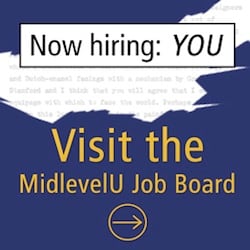When You’re Looking for a Nurse Practitioner Job and You’re Broke
One thing that many nurse practitioners don’t realize is that financing a job search can be quite costly. You may need to cover travel to and from interviews, purchase professional clothing, renew or obtain a DEA number or license to practice, or even relocate for your new position. These things combined can total thousands of dollars. In some cases a new employer may pitch in to cover costs or retroactively reimburse you for career related expenses. In others, you may be expected to cover these costs on your own.
Navigating the financials behind a career transition can be difficult. Perhaps you were laid off and hadn’t planned on changing jobs. Or, maybe you’re a new graduate with student loan payments looming and quickly diminishing bank balance. How do you navigate the sticky situation of lacking the cash required to land your next job?
The first rule of thumb when it comes to the cost of your job search is not to involve your prospective employer in your personal financial woes. Right, wrong, and even if for a justified reason, as a professional, letting on to your personal financial situation in the interview process (in general) is a big no-no. As a nurse practitioner applying to a near six-figure position, nickel and diming your prospective employer for travel costs and licensing fees will likely be perceived poorly. Do you really want a $200 state license renewal fee to jeopardize your job search?
 There are a few keys to approaching your nurse practitioner job search if you are dead broke. First, take advantage of the costs your prospective employer does cover. If a company offers to fly you out for an interview, by all means, take advantage of the opportunity. If your interviewer is discussing continuing education allowance benefits or other employment perks, slide in (ever so tactfully) “Do you cover the cost of licensing expenses as well?”. Bringing up these types of concerns later in the interview process once you have the employer hooked or the interviewer brings up the subject on their own is appropriate.
There are a few keys to approaching your nurse practitioner job search if you are dead broke. First, take advantage of the costs your prospective employer does cover. If a company offers to fly you out for an interview, by all means, take advantage of the opportunity. If your interviewer is discussing continuing education allowance benefits or other employment perks, slide in (ever so tactfully) “Do you cover the cost of licensing expenses as well?”. Bringing up these types of concerns later in the interview process once you have the employer hooked or the interviewer brings up the subject on their own is appropriate.
One mistake many nurse practitioners make is delaying certification or licensing in hopes that an employer will cover these costs. Being uncertified or neglecting to obtain a license to practice can, however significantly delay your job search. Employers are more hesitant to hire nurse practitioners who have not completed the licensing process. Not to mention, even if you are offered a position, the licensing process sets back your job start date during which you could have been earning an income. Find a way to finance your certification and licensure as soon as possible. By expediting your job search you will recoup this cash quickly-maybe even with a single day’s worth of work.
If your job search looks to be expensive and financing it yourself will be difficult, there are a few ways to approach the problem. First, determine which expenses are considered negligible and which are significant. A $200 licensing renewal fee should be considered negligible. It’s best not to bring this up to an employer in an interview as a make or break stipulation of your employment, or even at all. You risk looking like you can’t keep your personal financial affairs in order casting doubt your professional performance potential as well.
When it comes to significant costs, such as relocation, bring these up later in the interview process. The best time for this is typically as you negotiate the terms of your employment. Moving your furniture across the Pacific to accept a nurse practitioner position in Hawaii will cost you thousands of dollars. Think ahead if you are relocating for a new position. If your move will be expensive, ask for a relocation allowance. You don’t want to get into a position where you have accepted a job, signed on the dotted line, then can’t afford to move. As you negotiate the terms of such an agreement, avoid delving into the reasons behind why you cannot afford to cover these expenses on your own. This puts you on higher professional ground.
As a nurse practitioner, you are a professional. Keep this in mind as you think through the cost of your job search. Plan on covering expenses that will ultimately be insignificant given your salary should you accept the position. This helps secure your professional standing. Ask an employer to cover the cost of relocation but make sure to do so in a manner that doesn’t detract from your image. Overall, keep things professional rather than personal.
You Might Also Like: 7 Ways to Cut the Cost of Your Nurse Practitioner Education

